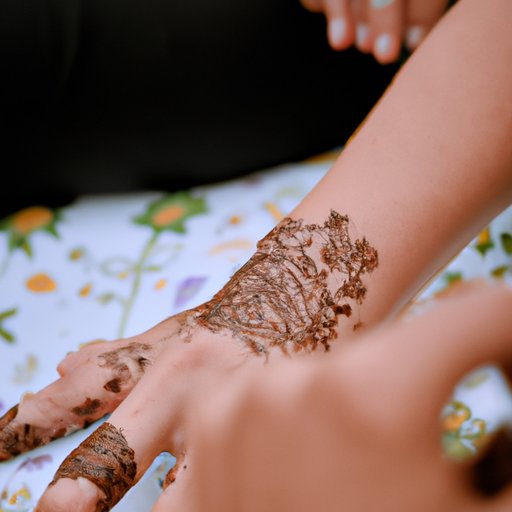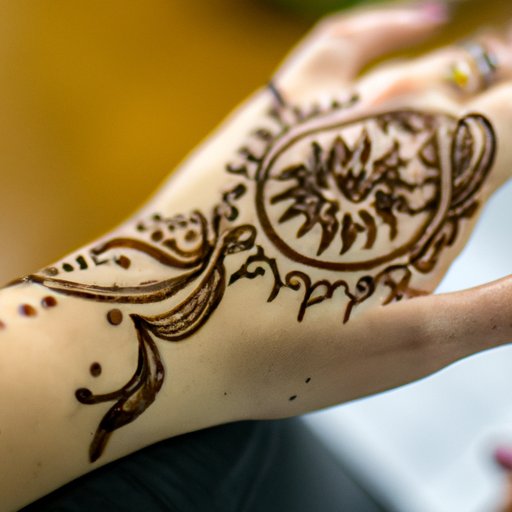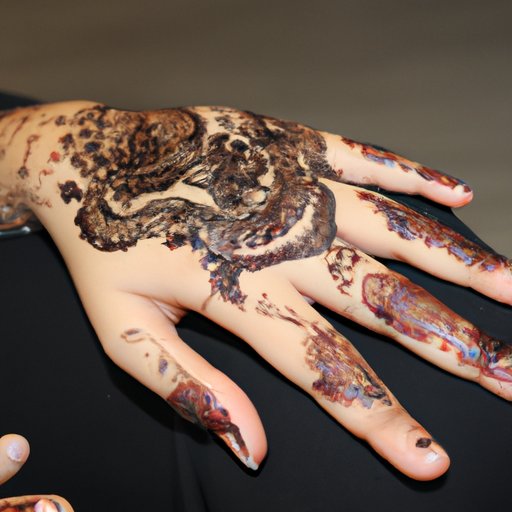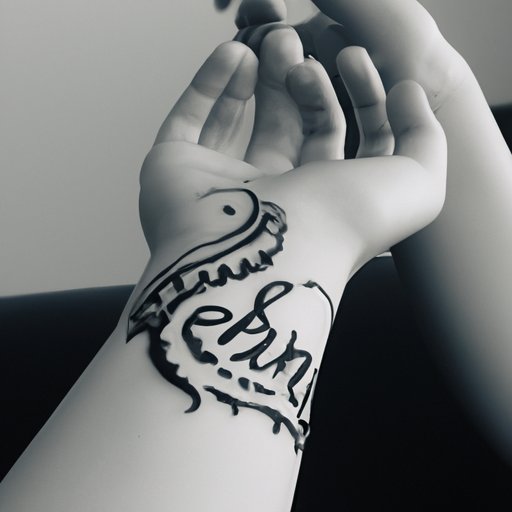Introduction
Cultural appropriation is a concept that has been widely discussed in recent years, with debates over whether certain forms of cultural expression are respectful or disrespectful. In particular, the use of henna has become a popular fashion statement, but is this cultural appropriation? This article will explore the origins of henna and its uses across different cultures, as well as examining the potential risks of cultural appropriation when wearing henna and the impact on traditional henna practices.

Exploring the Origins of Henna and Its Use in Different Cultures
Henna is a plant-based dye that has been used for centuries to create intricate body art designs. The use of henna dates back to the ancient Egyptians, who used it for cosmetics and medicinal purposes. In the Middle East, henna has long been used for special occasions such as weddings and religious holidays. Henna is also used in India, where it is known as “mehendi” and is often applied during festivals and other celebrations.
Examining Contemporary Uses of Henna and the Potential for Cultural Appropriation
In recent years, henna has become increasingly popular as a fashion statement. Many people choose to get henna tattoos, which are temporary designs that last anywhere from several days to several weeks. While henna tattoos can be a fun and creative way to express oneself, there is potential for cultural appropriation if they are not done respectfully.
According to a study published in the journal Current Issues in Tourism, many people view henna tattoos as a fashionable trend, rather than a meaningful part of cultural tradition. This can lead to cultural appropriation, as people may be unaware of the traditional meanings associated with henna. For example, certain symbols or motifs may have specific cultural connotations that are unrecognized by those who wear them as a fashion statement.

Investigating the Impact of Cultural Appropriation on Traditional Henna Practices
The misuse of henna as a fashion statement can have a negative effect on traditional henna practices. According to anthropologist Heather Laine Talley, cultural appropriation of henna can lead to a devaluation of the tradition, as people may be unaware of its cultural significance. This can lead to a lack of appreciation for the art form and a decrease in support for traditional henna artists.
Furthermore, cultural appropriation of henna can lead to misrepresentations of traditional henna symbolism. For example, some people may choose to get designs that are not traditionally associated with henna, such as cartoon characters or logos. This can lead to confusion about the meaning of henna artwork and an erosion of its cultural significance.

Analyzing the Pros and Cons of Wearing Henna as a Fashion Statement
Despite the potential risks of cultural appropriation, there are also benefits to wearing henna as a fashion statement. For many people, henna tattoos are a way to express their individuality and creativity. Furthermore, the temporary nature of henna tattoos makes them a low-commitment way to experiment with body art.
However, there are also potential consequences to wearing henna as a fashion statement. If done improperly, henna tattoos can be painful and cause skin irritation. Additionally, it is important to research the meanings behind traditional henna designs before getting a tattoo, as some symbols may have negative connotations in certain cultures.
Evaluating Popular Perceptions of Henna and Its Meaning Across Cultures
It is important to recognize that henna has a variety of meanings across different cultures. For example, in some cultures, henna is used to signify marriage, while in others it is used to celebrate religious holidays. Additionally, henna is often used to bring good luck or ward off evil spirits. Therefore, it is important to be aware of the deeper meanings associated with henna designs before getting a tattoo.
Unfortunately, there are also common misconceptions about henna. According to a study published in the International Journal of Cultural Studies, many people believe that henna is a universal symbol of beauty, rather than recognizing its cultural significance. This can lead to a lack of appreciation for the art form and a misunderstanding of its traditional meanings.
Discussing How to Respectfully Participate in Henna Traditions
If you are interested in participating in henna traditions, it is important to do so respectfully. One way to avoid cultural appropriation is to research traditional henna designs and their meanings before getting a tattoo. Additionally, it is important to seek out authentic henna artists who practice traditional henna techniques.
Furthermore, it is important to support and preserve traditional henna practices. This can include purchasing henna products from local artists, attending henna events, or donating to organizations that support henna artists. By doing so, you can help to ensure that authentic henna traditions are respected and preserved.
Conclusion
In conclusion, it is important to consider the potential for cultural appropriation when wearing henna. While there are benefits to wearing henna as a fashion statement, it is important to be aware of the traditional meanings associated with henna designs. Additionally, it is important to support and preserve traditional henna practices by seeking out authentic henna artists and purchasing products from local vendors. By doing so, we can ensure that henna traditions are respected and appreciated.
(Note: Is this article not meeting your expectations? Do you have knowledge or insights to share? Unlock new opportunities and expand your reach by joining our authors team. Click Registration to join us and share your expertise with our readers.)
